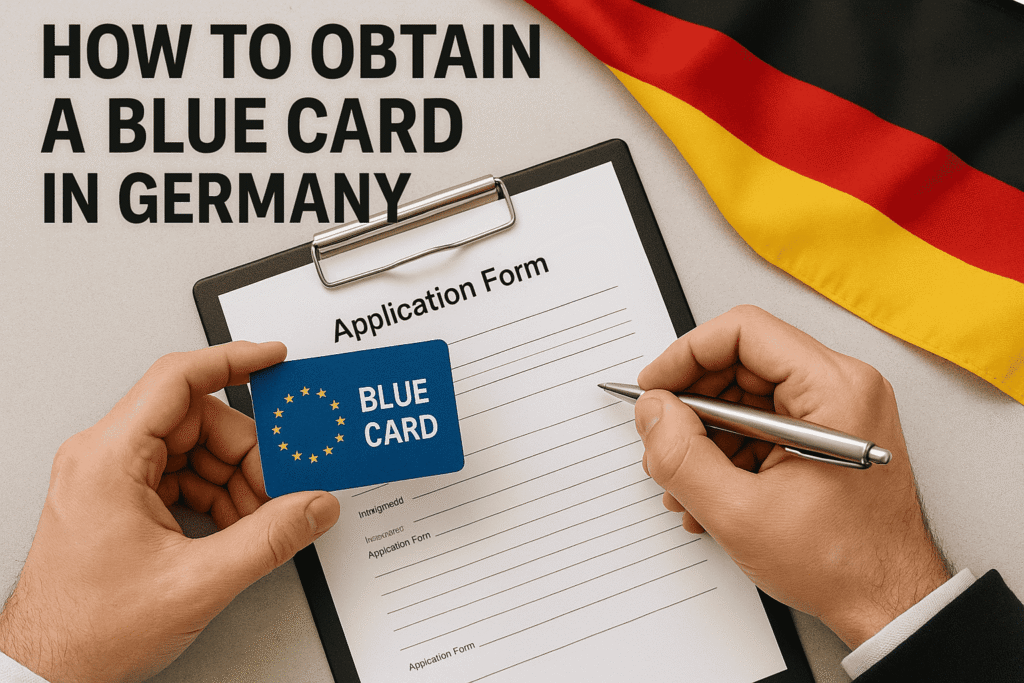
How to communicate with an employer in Germany: rules and business etiquette
Ethics and culture of business communication in Germany 📌 Traditions and etiquette when working with an employer ➡️ Key rules of conduct with management and colleagues
Are you planning to work in another country and considering moving to Germany? One of the most popular options for legal employment is the Blue Card, a special permit that opens the door to the European labor market. But to understand all the nuances, you need to know what a Blue Card is, what requirements apply in Germany, and how to properly complete the paperwork.

A Blue Card is a residence permit for highly qualified professionals from non-EU countries. It was created to attract foreign specialists to Europe, especially in areas where there is a shortage of workers. To put it simply, it is a kind of “golden visa” for those who have experience, education, and are ready to work in Germany or another EU country.
This card gives you the right to live and work legally in Germany, as well as to apply for permanent residence in the future. That is why many people are looking for information on how to obtain a Blue Card in Germany and what documents are required.
For Ukrainians, this program has several obvious advantages. First, it is a stable opportunity for official employment in a large European country. Second, the Blue Card for Ukrainians opens up access to benefits and advantages that simplify life abroad.
Among the main advantages are:
Therefore, if you dream of working in Germany and want stability, this card can be the key to a new stage in your life.
Not everyone can apply for a Blue Card, as the program is primarily designed for qualified specialists. There are clear requirements for obtaining a Blue Card, which should be taken into account before searching for a job.
Basic conditions:
In addition to the basic requirements, there are additional conditions that may influence the decision to issue a card. Formally, knowledge of German is not always mandatory, but it greatly facilitates adaptation and daily life in Germany. An impeccable reputation also plays an important role: candidates will have to provide a certificate of no criminal record, as security issues are checked very carefully here. Equally important is proof of medical insurance – without it, it is simply impossible to obtain a Blue Card, as this is a mandatory requirement for residence in the EU.
In general, young professionals with higher education in IT, medicine, and engineering, as well as experienced specialists who are actively sought after by companies in the German labor market, have the best chances of obtaining a Blue Card. At the same time, this does not mean that humanities or economics graduates are out of the running – if an employer is willing to offer a salary above the established threshold, the door to the Blue Card is also open to them.
Not every specialty automatically falls under the program’s conditions. Germany has an official list of shortage occupations for which the requirements are lower. This means that the minimum salary for obtaining a card is lower here than in other fields. It includes:
This list is not exhaustive: it is regularly updated depending on changes in the German labor market. Today, the main demand is concentrated in medicine and IT, but other areas may emerge in the future.
It is worth knowing that even if your profession is not on this list, you can still obtain a Blue Card. In this case, the key factor will be your salary level. If it meets the general high threshold, Germany is ready to consider your application regardless of your specialty. This opens up opportunities for economists, marketers, or managers who have experience and can confirm their qualifications with a contract card from their employer.
Thus, the Blue Card is not only a tool for specific shortage occupations, but also a flexible mechanism for attracting specialists in various fields. The main thing is to meet the established requirements.
To apply for a card, you need to prepare a set of documents. It is important to take this seriously, as the speed of the decision depends on the correctness of the documents. The main list is as follows:
These documents must be submitted to the Foreigners’ Registration Office in Germany. If something is missing, the process may be delayed.
This question often concerns candidates. In most cases, the Blue Card requires a diploma, as it was created to attract specialists with higher education. But there are exceptions.
For example, IT specialists in Germany can apply even without a higher education if they have sufficient work experience and a contract with a company. The main thing here is to confirm your qualifications with practical experience.
So, although the program is aimed at people with diplomas, there is also a chance to obtain a card without a degree, especially in sectors where there is a shortage of personnel.
Once the documents have been collected, the application process begins. It looks like this:
If you are planning a serious move, it is worth consulting with lawyers or specialists who have experience in such matters in advance. This will help you avoid delays and mistakes in the process.
The Blue Card is a real opportunity for Ukrainians to build a career in Europe, gain stability and benefits, and open the door to life in Germany. The card not only gives you the right to work, but also becomes the first step towards permanent residence in the EU. If you are ready to confirm your qualifications and meet the requirements, then the question “How to get a Blue Card in Germany” turns into a clear and understandable plan of action.